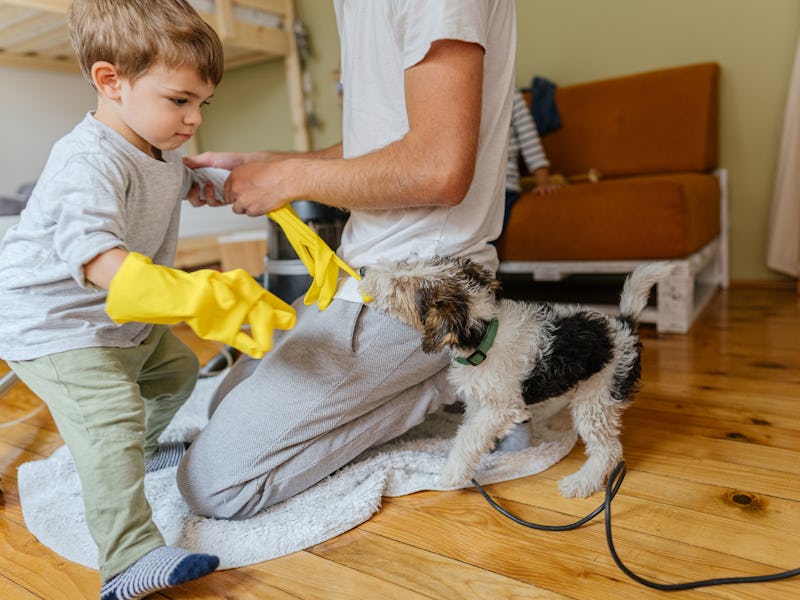This Common Household Cleaner Puts Puppies at Risk, a Veterinary Toxicologist Says
Many cleaning products contain chemicals that, in large enough amounts, can be toxic to animals.

Cleaning products are crucial to keeping our homes clean and fresh. But are they safe for the furry creatures that live with us? Pets like cats and dogs stick their noses in so many things, not all of which are good for them. With that in mind, here’s how to ensure your cleaning routine is safe for your non-human best friend.
It’s all about concentration
Many cleaning products contain chemicals that, in large enough amounts, can be toxic to humans and animals. Senior veterinary toxicologist Ahna Brutlag at the Pet Poison Helpline and member of the American Board of Veterinary Toxicology, says bleach, ammonium, phosphoric acid, hydrogen peroxide, sodium hydroxide, and any type of phenol all appear in common household cleaners. When applied to the eyes or skin, like the exposed paw pads, they can irritate and even burn your furry friend.
But there is some good news: The concentration of these products matters, Brutlag says. Multipurpose surface and glass cleaners, for example, “have a pretty wide margin of safety,” she tells Inverse. What’s most crucial is using these products according to their directions. For example, if a spray directs you to rinse a surface with water after applying, then you certainly should.
Brutlag also suggests keeping pets away from freshly spritzed areas. A rule of thumb is that the area is safe again once you can no longer smell it. At that point, the spray has set and evaporated into the ether. Opening a window or turning on a ventilator while you’re cleaning can help to circulate fresh air for you and your pets and get rid of the smell faster.
Non-mammals need protection, too
Opting for homemade cleaners made from vinegar, baking soda, and lemon isn’t necessarily safer, either. Vinegar may seem like a more wholesome option, but it will still sting your cat’s tongue if they walk through some and then groom themselves.
Brutlag calls out exotic pets. Birds are vulnerable to inhaling airborne particles that aerosols and spray bottles produce, so removing them from a room when using these chemicals is imperative. Amphibians can absorb compounds through their skin, so ensuring they’re safely locked away in their enclosures is a must. Once a cleaner’s scent disappears, feel free to uncover their tank again.
“Prevention, prevention, and prevention”
More potent, corrosive cleaners like oven, drain, and toilet cleaners and rust removers, “have the potential to be significantly more harmful for people and pets.” These more caustic ingredients come in higher concentrations, so these products are much less diluted. “An ingredient is safe or dangerous based on the concentration,” she says.
These products also have a significantly higher or lower pH balance, which measures how acid or alkaline a substance is on a scale of 0 to 14. Water, for example, is completely neutral at 7. Bleach, oven cleaner, and drain cleaner come in at 13 and 14, making them extremely basic. These extremes make them such effective cleansers, but if you’re still concerned about their potency, you can dilute them further.
Dogs, especially puppies, are at high risk for poisoning because of their penchant for eating foreign objects. The form a cleaner comes in may also make it more dangerous to animals. According to David Dorman, professor of toxicology at North Carolina State University’s College of Veterinary Medicine, bite-sized dish and washing machine pods are of particular risk to dogs, who love putting things in their mouth. He urges pet owners not to discount any substance as a potential harm. This isn’t to say you should stop buying them, but rather that you should use and store them carefully.
Another aspect of cleaning and pet safety comes from how well-prepared you are. Dorman has three safety rules: “Prevention, prevention, and prevention,” he tells Inverse. Properly storing cleaning agents out of reach can save you and your pet a world of suffering. If that fails, then having a poison control number on the fridge means less vital time wasted looking up information.
If your pet walks through a puddle of cleaner or spills some on their coat, their skin or eyes may burn. You may notice your pet pawing at their eyes or chewing on a body part more than usual. In some cases, the strongest corrosives can even burn your pet’s tongue. Dorman suggests doing your best to wash the exposed area off with running water, though he acknowledges not every pet, especially those in discomfort, will be amenable to that.
Household cleaners are safe to keep around your pets as long as you’re mindful of where you keep them and how you use them. Provided you do that, cleaning around your pets should be a stress-free chore.